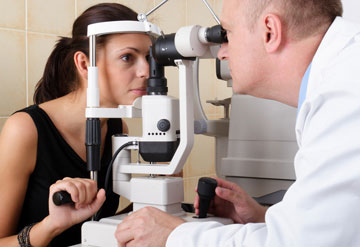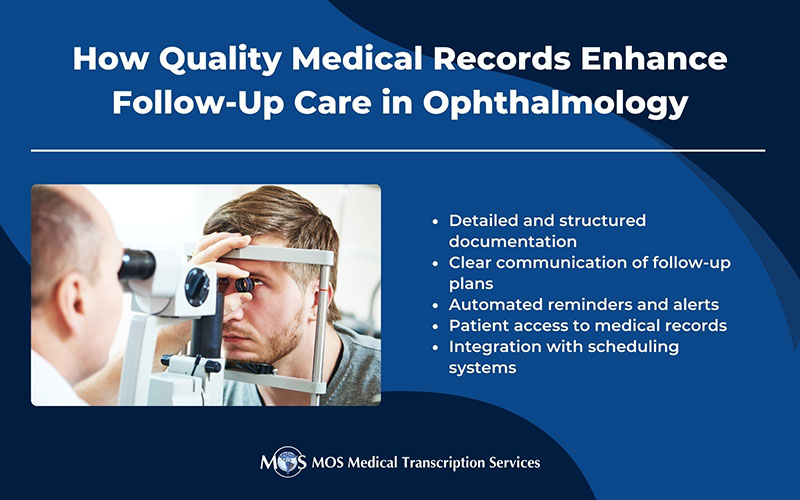
Follow-up appointments are crucial in all medical specialties. Eye health can change quickly and small issues can become serious, making follow-up appointments with an eye specialist particularly important. Ophthalmology follow-ups help manage eye health and prevent sight loss. However, poor follow-up in patients with chronic eye conditions is a major concern. Just like other medical specialty, ophthalmologists also require accurate medical records to assess the progress of treatment, monitor eye health, and provide counseling. Ophthalmology transcription services can play a key role in this context. By improving ophthalmology medical records, outsourcing transcription can significantly reduce poor follow-up by enhancing the accuracy, accessibility, and clarity of patient information.
Importance of Ophthalmology Follow-up Appointments
During a patient encounter, ophthalmologists document important details including patient history, medicines prescribed, lab reports etc. Detailed medical records make it easy for them to communicate with the patient and chart out a suitable treatment plan.
In ophthalmology follow-up is crucial to manage chronic eye diseases which can lead to irreversible loss of sight, such as glaucoma and age-related macular degeneration.
Follow-up appointments help ophthalmologists:
- Monitor complications: Eye treatments can have risks, and follow-ups can help monitor for complications like nerve damage.
- Track age-related eye diseases: More than half of diagnosed eye diseases are age-related.
- Provide counseling on eye care: Follow-ups can help patients learn how to properly care for their eyes.
- Check for recurrence: Follow-ups can help check for the recurrence of eye cancers.
- Identify the effects of other diseases: Follow-ups can help determine how other diseases, like diabetes or brain tumors, impact the eyes.
- Manage chronic eye diseases: Follow-ups are especially important for managing chronic eye diseases like glaucoma and age-related macular degeneration.
Patients at Risk Due to Poor Ophthalmology Follow-up
Despite the importance of follow-up, studies show that “lost to follow-up” (LTFU) is a widespread phenomenon in ophthalmology. Up to one-quarter of patients were lost to follow-up after an eye-related emergency department (ED) visit, according to a study published in the American Journal of Opthamology in 2021.
The study was based on an analysis of the medical records of 2,206 patients seen in the ED for an eye-related issue who were subsequently scheduled for ophthalmology follow-up between 2013 and 2019 at a single tertiary health system.
Despite the importance of timely follow-up after an ED visit, previous studies in other medical specialties have reported that nearly half of patients referred for follow-up care after ED discharge do not complete follow-up. The researchers found that ED revisit rates were significantly higher among patients lost to follow-up.
During a patient encounter, ophthalmologists document important details including patient history, medicines prescribed, lab reports etc. Let’s see how comprehensive medical records can make it easy for them to communicate with the patient, reduce loss to follow-up and improve quality of care.
How Improving Ophthalmology Medical Records can Reduce Poor Follow-up
Ophthalmology medical records include Progress notes, Prescriptions, Charts, Reports, Laboratory results, Technical information, Letters, Photographs, X-rays, and Diagnostic imaging.
Here are some key ways that quality medical records can improve follow-up care in ophthalmology:

- Detailed and structured documentation: Ophthalmology records that include structured templates ensure critical information like visual acuity, intraocular pressure, and treatment notes are consistently documented. This thoroughness allows future providers or the same provider in follow-up visits to quickly understand the patient’s history and current status.
- Clear communication of follow-up plans: Incorporating precise follow-up instructions and time frames into the medical records can improve patient adherence to the recommended care plan. When follow-up details are clearly documented, both patients and providers are reminded of the necessity and timing of follow-up appointments.
- Automated reminders and alerts: Many electronic health record (EHR) systems offer automated reminders for follow-up visits. By integrating ophthalmology-specific criteria into these reminders, practices can ensure that patients return for critical assessments after procedures or treatments.
- Patient access to medical records: Granting patients access to their ophthalmology records through patient portals encourages self-management and awareness. This access empowers patients to review their diagnoses, treatment plans, and follow-up recommendations, which can enhance compliance.
- Integration with scheduling systems: When medical records are integrated with scheduling software, ophthalmologists can streamline the process of setting up follow-up appointments at the time of care. This integration reduces the likelihood of missed or forgotten appointments and improves continuity of care.
Partnering with an experienced medical transcription company can improve these areas within ophthalmology medical records. By ensuring timely and accurate EMR-integrated documentation solutions, specialized medical transcriptionists can help practices can address common barriers to follow-up and ensure better long-term outcomes for their patients.